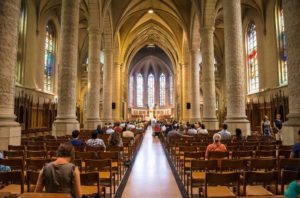The Humanevangelist: Time for the Catholic Laity to Take Control

More than a billion Catholics have no vote or voice in how their church operates. Revelation after revelation of high-level child-abuse conspiracies have failed to shift power. But now, eight centuries after Magna Carta trimmed the sails of King John, the world’s largest remaining feudal monarchy is trembling.
In an Atlanta church last week, an ordinary dad stood up during mass and challenged his priest to explain how things would change in the wake of the recently-released Pennsylvania report. More than a thousand American Catholics have signed a letter calling on all the bishops to resign. And now, a senior Vatican official charges that Pope Francis not only tolerated but elevated disgraced Cardinal Theodore McCarrick after being informed in 2013 that he was under sanctions for child abuse.
I admire the courage and moral clarity of those who are speaking out. But, honestly, it’s just not enough. The time has come for the Catholic laity to dismantle the unconstrained hierarchy that stands between them and their faith.
Frankly, it’s long overdue. A child born on the day Pope John Paul II declared sexual relations with a minor a grave sin is just months from adulthood today. Two popes, countless commissions, and many mea culpas later, has the hierarchy come clean?
Evidently not. As a Pennsylvania grand jury labored to wind up its devastating investigation into clerical abuse of more than a thousand children, diocesan lawyers fought to keep its findings secret. Think about what that means. A year after Pope Francis declared “zero tolerance” for such “atrocities,” the Church tried to cloak them. This wasn’t just legal maneuvering. Five of six bishops refused to take the stand, choosing instead to submit written statements.
What the grand jury uncovered was not only a history of child-rape and victim-intimidation, but a “playbook” for covering up the crimes. The jury members and judge did noble work, but, honestly, that too is not enough.
Even now, courts have clearly failed to root out all the secret crimes and cover-ups. Bear in mind that the Roman Catholic Church is a global entity, and most of its members do not enjoy the protection of an American jury. In Africa, victims who speak out find little redress. Yet, there can be no doubt that clerical abuse has also occurred there.
We have the word of the Archbishop of Johannesburg for it. Buti Tlhagale bluntly told his parishioners that priests across Africa are “preying on unsuspecting victims, inflicting irreparable harm, and continuing to do so with impunity.” He argued that the growing impression of Catholic priests as “wolves wearing sheep’s skin” will destroy the Church across the continent.
Some might think that, as a humanist, I would welcome its destruction. That’s not true. I bear no hostility to Catholics or the Catholic faith per se. I’ve long argued that religion can be reconciled with a rational, democratic, and humane view of life, and I’ve seen inspiring instances of it. But, given what we know of human and institutional nature, neither a celibate priesthood nor a feudal command structure are compatible with that vision.
Some might say, “Mind your own business.” I readily admit, it’s their church, not mine. But the hierarchy’s victims are mostly children. Moreover, the Vatican has worked tirelessly to impose its dogma on all of humanity—with devastating consequences.
In Ireland, harsh and faith-based policies on out-of-wedlock pregnancy and a ban on abortions led to hideous abuses at Catholic orphanages. We now know that hundreds of babies and children taken from their unwed mothers and left in the care of nuns soon ended up in mass graves. So much for the Sisters of Mercy.
In Africa, the Vatican’s anti-condom propaganda has contributed to the AIDS deaths of millions, and has left millions of AIDS orphans to be cared for by a predatory church. You cannot ask me, or anyone, to stay silent about crimes like that.
Now, it would be arrogant to dictate to you, my Catholic friends, just what steps you should take. But, as you are believers in divine will, it is my earnest hope that you will now see taking control of your church –at the very least, demanding the right to elect and eject those in offices of trust–as God’s own work.
